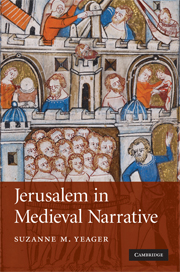Book contents
- Frontmatter
- Contents
- Acknowledgments
- List of abbreviations
- Introduction: texts and contexts
- 1 Pilgrimage to Jerusalem: three accounts by English authors
- 2 Craving heritage: portrayals of Richard I and the English quest for Jerusalem in Richard, Coer de Lyon
- 3 The crusade of the soul in The Siege of Jerusalem
- 4 The Book of Sir John Mandeville: text of pilgrimage and spiritual reform
- 5 Beyond the Celestial and Terrestrial Jerusalem: the Promised Land in western Christendom
- Conclusion
- Notes
- Bibliography
- Index
- CAMBRIDGE STUDIES IN MEDIEVAL LITERATURE
5 - Beyond the Celestial and Terrestrial Jerusalem: the Promised Land in western Christendom
Published online by Cambridge University Press: 22 September 2009
- Frontmatter
- Contents
- Acknowledgments
- List of abbreviations
- Introduction: texts and contexts
- 1 Pilgrimage to Jerusalem: three accounts by English authors
- 2 Craving heritage: portrayals of Richard I and the English quest for Jerusalem in Richard, Coer de Lyon
- 3 The crusade of the soul in The Siege of Jerusalem
- 4 The Book of Sir John Mandeville: text of pilgrimage and spiritual reform
- 5 Beyond the Celestial and Terrestrial Jerusalem: the Promised Land in western Christendom
- Conclusion
- Notes
- Bibliography
- Index
- CAMBRIDGE STUDIES IN MEDIEVAL LITERATURE
Summary
The previous chapter has discussed the ways in which ancestral and hereditary claims to Jerusalem were seen to rely on ideals of communal morality, and that the Papal Schism and Hundred Years War, among other events, were held up as moral entanglements of a spectacular nature, threatening English associations with Jerusalem in all four of its senses. In the creation of an English identity separate from that of the French, and likewise distant from that of those regions tributary to France, much depended on the portrayal of English morality. To this end, English writers modeled the very forms that French and Frankish writers had already employed for nearly seven centuries to distinguish themselves from their many neighbors as a chosen people, honored by God. This tradition was reinforced during the crusades, for, as many of the crusading chronicles by French authors attest, the First Crusade was fought and won primarily by the Franks. Such claims to divine authority through a selectively recorded crusading history represents, as I have argued, a bid for sacral power. As the crusade chronicles remembering Pope Urban's speech recount, and as King Richard I explained in his letters to Saladin, or as Sir John Mandeville's Book later echoes, Jerusalem deserved adoration for its place in the Passion, but also conferred divine favor on its owners. This textually constructed, sacral reality defined communal identity by means of creating shared memories of the Holy Land and the crusades.
- Type
- Chapter
- Information
- Jerusalem in Medieval Narrative , pp. 135 - 163Publisher: Cambridge University PressPrint publication year: 2008

